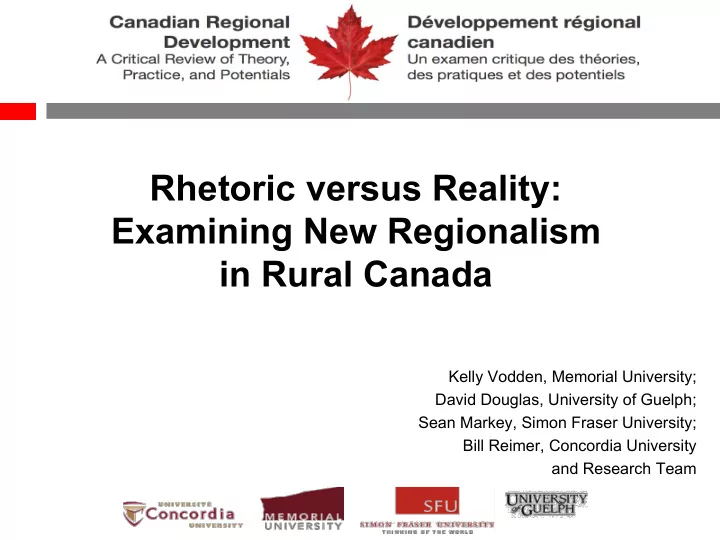

Rhetoric versus Reality: Examining New Regionalism in Rural Canada Kelly Vodden, Memorial University; David Douglas, University of Guelph; Sean Markey, Simon Fraser University; Bill Reimer, Concordia University and Research Team
New Regionalism in Rural Canada The question: New Regionalism’s presence and promise for Canadian rural regions? § ‘ New Regionalism’ as a mixture of theories and concepts that has purported to explain the post-Fordist evolution of a faltering regional development regime § Emergent theorizing offers a normative or prescriptive body of principles to inform a reconstituted development policy and practice
Old vs. New Regionalism OLD ¡REGIONALISM ¡ NEW REGIONALISM ¡ Hierarchy-based system ¡ Network-based system ¡ Government ¡ Governance ¡ Structure ¡ Process ¡ Closed ¡ Open ¡ Coordination ¡ Collaboration ¡ Accountability ¡ Trust ¡ Power ¡ Empowerment ¡ Source: Wallis, Allan. 2002. “The New Regionalism: Inventing Governance Structures for the Early Twenty-First Century.” www.miregions.org (August 23, 2011).
Canadian Context • Distance and density • Staples dependency • Weak theorization and poor track record of regional development • Decades of change post mid-1980s • Little cross-provincial analysis
Key Elements of New Regionalism Collaborative Multi-Level Governance Place-Based Learning and Developmen t Innovation Rural Urban Integrated Interactions Development
Sample Indicators Place-based Learning & Governance Integration Rural-urban Innovation links Place branding R&D financing Stakeholder Participatory Flows of goods engagement process Buy local Knowledge Multi-sector Complexity Institutional infrastructure collaboration acknowledged links Community- Knowledge Multiple levels Multi- Environmental based sharing of government disciplinary services resource partnerships involved perspective management Community Learning and Local level Holistic Movements of associations reflection power approach people processes
Research Methodology Mixed methods, interdisciplinary, case study-based § 4 + 1 case study regions § Core themes and indicators § Document/literature review; 189 semi-structured interviews; (participant) observation § Coding and pattern searching § Multiple analytical “ passes ” with team dialogue and theme vs. case study region team cross-checking
New Regionalism in Rural Canada Findings – General § With some variations across Canadian regions, sometimes within regions, and across the five identified key themes, in general, there is a significant gap between policy and practice and the theory and rhetoric of new regionalism and new regionalist ideas. § Points to challenges in policy and practice but also with new regionalism
‘New Regionalism’ in Rural Canada Findings – Multi-Level Governance § Regional organizations have promoted a variety of multi- sector governance arrangements (often senior government-facilitated) § Only occasionally involves policy or program co- construction § Often reliant on sometimes single purpose, fragile organizations that lack significant capacity § In some regions considerable inter-local government collaboration – a foundation for regional governance?
New Regionalism in Rural Canada Findings – Learning & Innovation § Informal knowledge flows through diverse personal and other networks, ‘quiet’ and pragmatic innovation in rural communities, households, enterprises and organizations § More formal networks transfer knowledge and skills across professional interest groups (e.g. EDOs) § BUT processes of, and organizations associated with innovation concentrated in major urban settings § Minimum interregional or inter-provincial transfer of knowledge or deliberate learning and reflection
New Regionalism in Rural Canada Findings – Rural-Urban Relationships § Continued urban-rural conflict and competition despite changing residential mix, rural economies, overlapping interests, extending commuter travel patterns etc. § Limited attention to most types of interdependencies § Evidence to support critiques of urban-centric new regionalism (increasingly so - city regionalism?)
New Regionalism in Rural Canada Findings – Place-Based Development § Evidence of a strong local sense of place and identity(ies) but generally not associated with official regions § Some place-based identities extend to groups of communities, recognized landscapes, cultures, histories § Most identify array of assets that afford development opportunities (including identity) but strategic application is limited § Issues of compatibility with old and new regionalist ideas of place and place-based development § Role for regional development organizations
New Regionalism in Rural Canada Findings – Integrated Development § Development policies and practices that might be regarded as highly integrated are rare § Dissonance between professional and other practitioner appreciation of complexity and interconnected nature of development issues and policies and practices § Little response in development practice to balancing questions of economic growth and social equity; attempts to take a holistic perspective in development design and implementation remain uncommon
Conclusions • Recognition that regions and regional development matter • New regionalist practice emergent at best in small town and rural Canada • Significant barriers to new approaches • Time and legacies as key factors • Need for increased attention to rural and rural- urban dynamics and a more holistic view of development
Implications for Policy and Practice § Recognize entanglements and potentials of old and new regionalisms and regional identities § Nurture and support local capacity and connectedness § Demonstrate and build from successes § Continue to explore and advance approaches for rural and rural-urban regionalism – learning, adaptive approach
This multi-year research initiative is investigating how Canadian regional development has evolved in recent decades and the degree to which New Regionalism has been incorporated into policy and practice. Five key themes are examined: (i) place-based development, (ii) governance, (iii) knowledge and innovation, (iv) rural-urban relationships, and (v) integrated development. The project is funded through the Social Sciences and Humanities Research Council of Canada and the Leslie Harris Centre of Regional Policy and Development. Website: http://cdnregdev.ruralresilience.ca/ Research Team Kelly Vodden (Memorial University) Ken Carter (Memorial University) David Douglas (University of Guelph) Jen Daniels (Memorial University) Sean Markey (Simon Fraser University) Ryan Gibson (Memorial University) Bill Reimer (Concordia University) Craig MacKie (Concordia University) Luc Bisson (Université du Québec a Rimouski) Heather Hall (Memorial University) Sarah-Patricia Breen (Simon Fraser University) Sarah Minnes (University of Guelph) Matthew Brett (Concordia University) Kyle White (Memorial University)
Recommend
More recommend